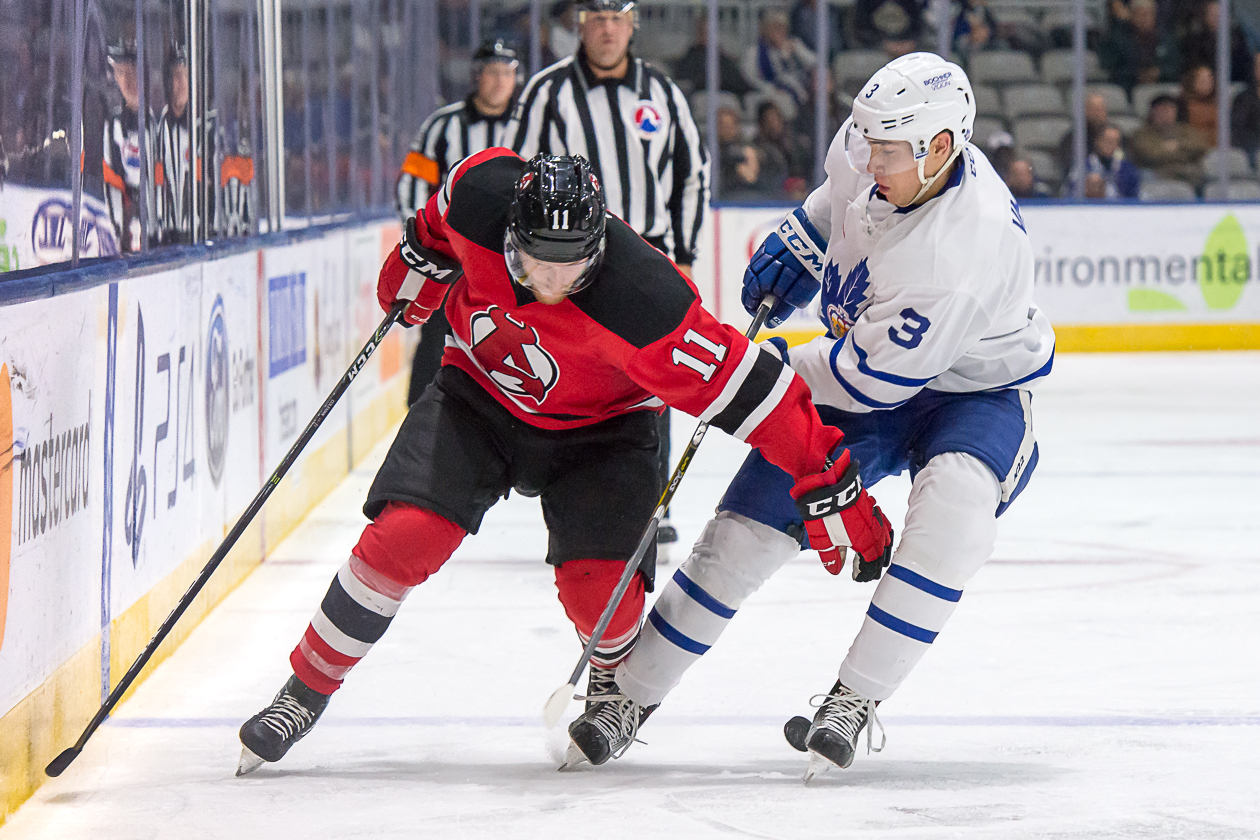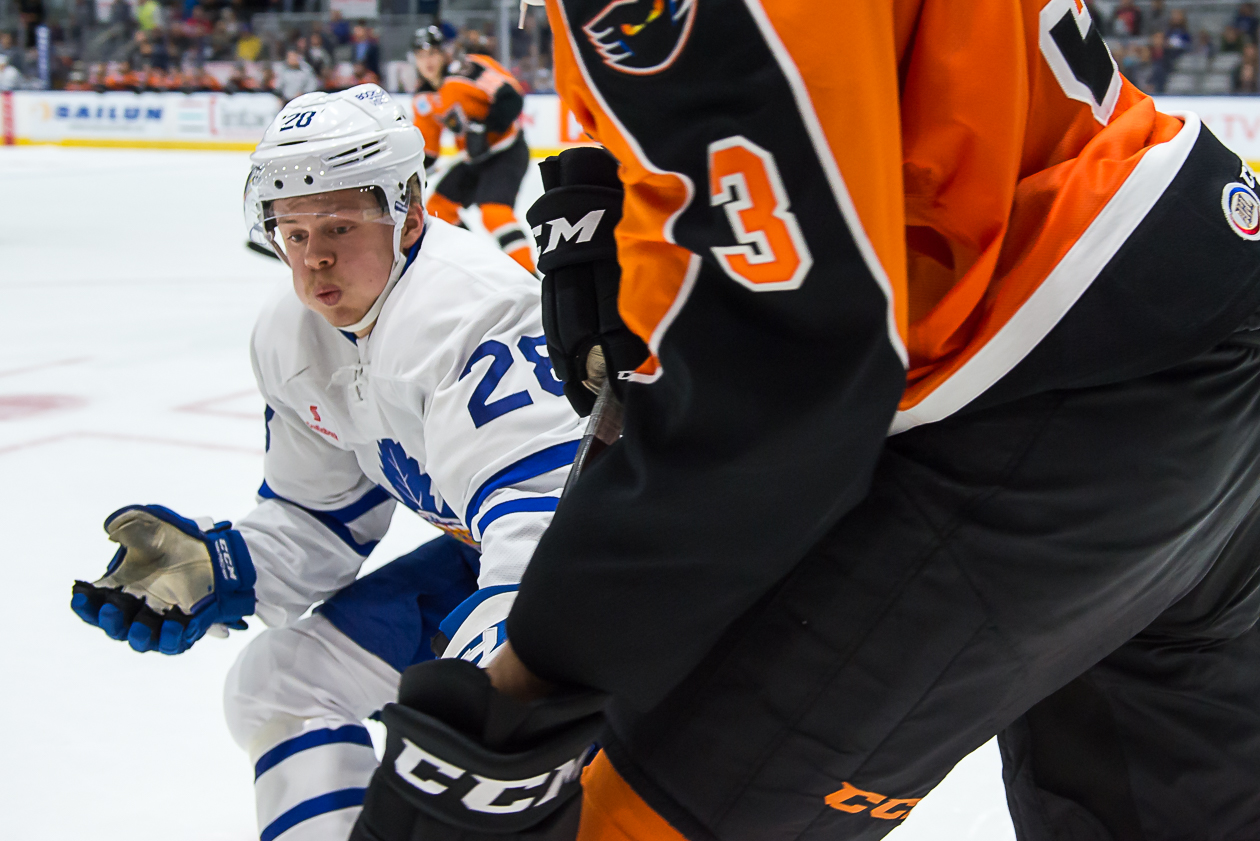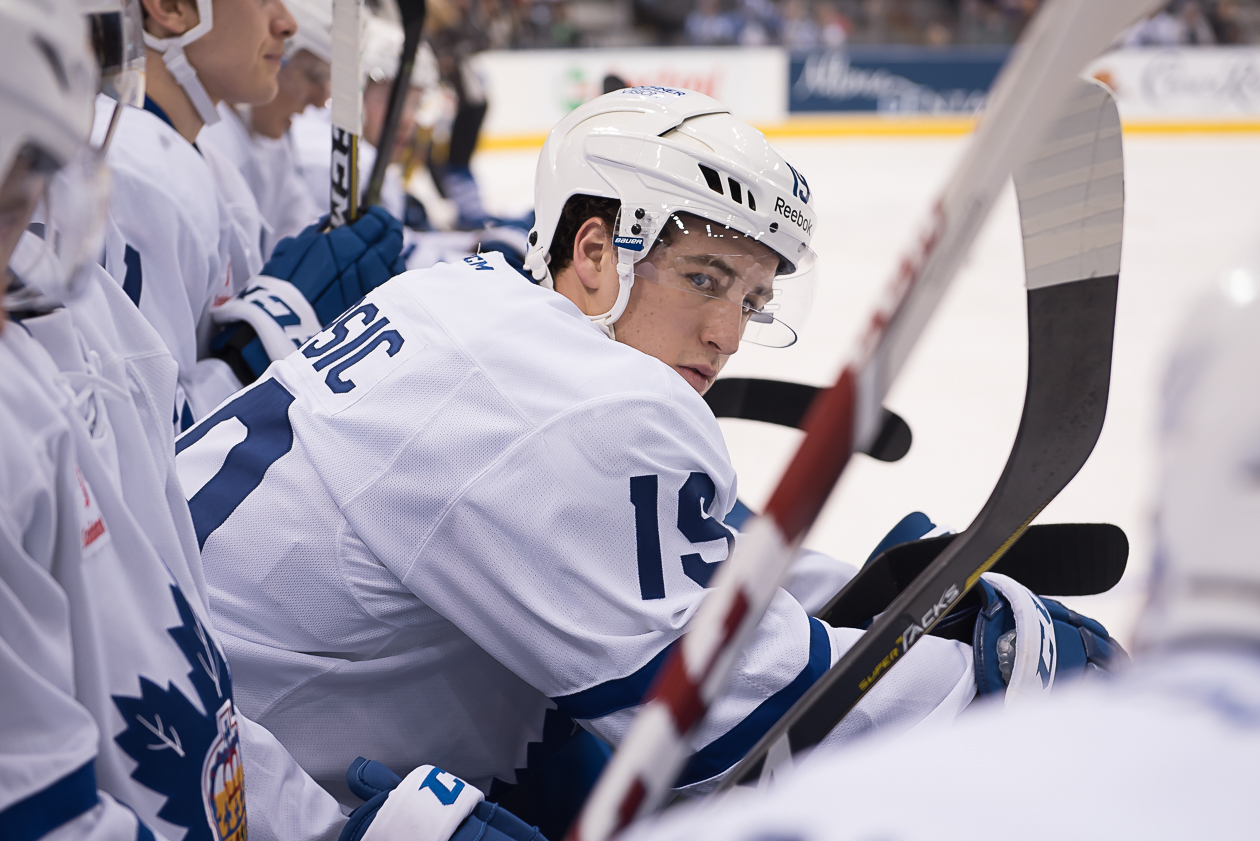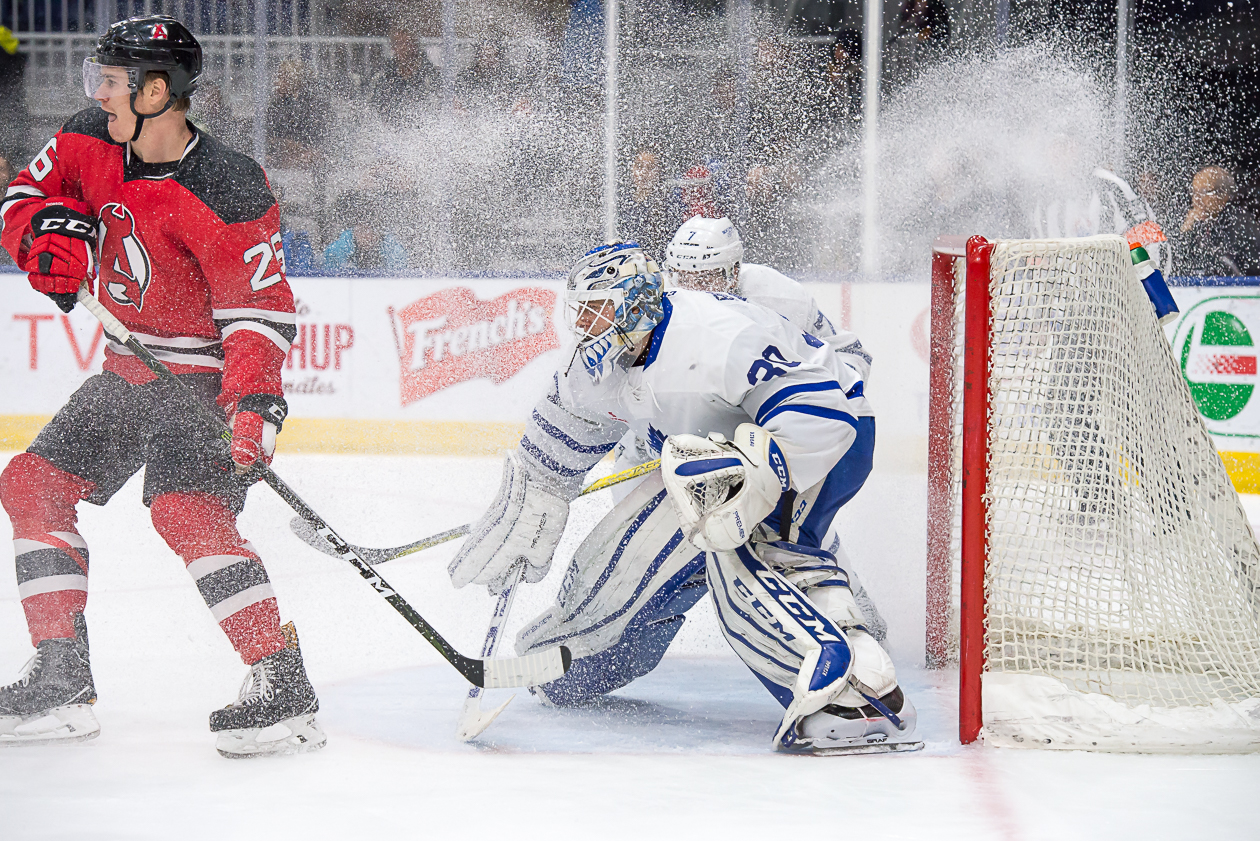The 2015-16 Toronto Marlies will forever be remembered by those who bore witness to their exciting brand of hockey. Despite not fulfilling their championship potential, the team broke multiple records and proved incredibly entertaining to watch.
Expectations needed to be lowered somewhat for 2016-17, with a whole host of offensive talent from last year’s roster either moving onto pastures anew or graduating to the NHL — William Nylander, Connor Brown, Josh Leivo, Marc Arcobello, T.J Brennan, Zach Hyman and Nikita Soshnikov, to name just seven.
The opening day roster nonetheless provided enough reason to believe that this could be a promising campaign for the Marlies with the possibility of another deep playoff run. The beginning of the season did little to dismiss that train of thought — Toronto won six of their first seven games, scoring 27 goals and recording two shutouts in the process.
In truth, those victories came against less-than-stellar opposition for the most part while covering up a multitude of sins that have since come back to bite the Marlies. At the turn of the new year, the Marlies find themselves two games under .500 and are only clinging onto a playoff berth due to the relative weakness of the North Division.
So why is Toronto struggling so much after a promising start to the season?
Defensive Deficiencies

On a game-by-game basis, Toronto has consistently turned the puck over in their own zone, sometimes unforced.
While he should be afforded plenty of leash as a first-year pro, rookie Andrew Nielsen has notably struggled in this aspect and so has Justin Holl. But the problem isn’t limited to just those two (or the defense in general, as Colin Smith proved in the last game of 2016).
Even when not directly leading to goals against, errors in Toronto’s zone are often leading to penalties against and excessive time spent running around in their own end. It’s consistently allowing opponents to gain momentum, especially at crucial junctures of the game, and has placed more burden on the Marlies‘ already-strained goaltending.
Missed assignments and poor coverage are also issues — for the team in general but especially the blue line group — that are holding the team back in this area.
Penalty Troubles
As of New Years Day, the Marlies have been shorthanded 149 times in 30 games — in percentage terms, that’s second highest in the league.
Add in the fact that Toronto’s penalty kill has not been good at all this season (currently 79.2%) and it’s been a destructive combination. Only the Texas Stars have given up more goals than Toronto’s total of 31 while down a man.
Whether poor judgment or a lack of discipline, combined with the turnovers breaking out and the poor play defensively, it’s led to far too much time spent shorthanded. The penalty differential now sits at minus ten. To give an idea of how bad it’s been at stages this season, that number has actually been improved by four over the last three games.
This is one glaring issue that is both unacceptable and can’t be excused on the basis of a less talented roster.
Offensive Production

With less high-end skill on the team, the drop-off in goal production since the seven-game mark has been astronomical. After pushing towards four goals per game out of the gates, Toronto is averaging just 2.43 since. They’ve been bailed out somewhat by a powerplay that is clicking at 23.7%, but the Marlies are not producing like a playoff team at even-strength.
Of the 83 goals tallied this season, 33 have come on the man advantage and a further three while shorthanded. Of Toronto’s last sixteen goals, nine have been tallied on the powerplay.
There has been too much reliance on Brendan Leipsic and Kasperi Kapanen, the two players on the Marlies flirting with a point-a-game or above this season. The opposition is aware of this and can plan accordingly.
The lack of skilled depth at centre is also an issue, with the veterans (outside of Byron Froese, if you can consider him one) producing next to nothing offensively. Sheldon Keefe has tried all sorts of experimentation out of desperation or when faced with an injury, including trying out Leipsic down the middle.
In addition to the lack of scoring depth among the forward group, there has been little help coming from the blue line. Andrew Nielsen has taken up some of the slack left by T.J Brennan’s departure on the powerplay, recording 16 of his 21 points on the man advantage. Outside of Nielsen, the Marlies have received just three even-strength goals from their defencemen (single tallies from Justin Holl, Viktor Loov and William Wrenn). More was expected from Justin Holl and captain Andrew Campbell, who recorded career highs last season.
Part of the problem is that Toronto simply isn’t spending enough time in the offensive zone over 60-minute games. A failure to win enough board battles to extend possession means less opportunity to feed the points. But the defensive issues at the other end, leading to extended own-zone time, as well as issues with offensive zone entries are also contributors.
More often than not, Toronto is only able to muster a single shot per zone entry and they simply aren’t producing enough quality scoring chances or second-chance opportunities.
With scoring chances at a premium, players have been gripping their sticks a little tighter — that certainly seems to be the case for Colin Smith, Dymtro Timashov, Kerby Rychel and Tobias Lindberg, who are all shooting between 6-9%.
Slow out the blocks, falling at the finish

If Toronto has failed to get their noses in front through 20 and 40 minutes of play this season, we can be pretty certain they aren’t going to take any points from the game. The statistics plainly spell it out: When tied or behind after two periods of play, Toronto has managed just five points in 18 attempts (1-4-1-0 and 1-11-0-0 respectively).
During the last eleven games, Toronto has only once carried the lead after the opening period and has thrice faced a two-goal deficit. They’ve also only opened the scoring once during that stretch.
The statistics are even more damning if we look further back: Since the opening seven games of the season, the Marlies have been cumulatively outscored in each period of play and are particularly poor in the final frame. Toronto has been a no-show in third periods all season long, with a combined shot difference in the negative and a minus-eleven goal differential (just 20 goals for).
Veteran Struggles
In Milan Michalek, Colin Greening and Brooks Laich, the Marlies have three experienced players who should have been significant contributors to this team in a variety of ways. With so many new faces (especially at forward) on the roster, the coaching staff was counting on that to be the case, especially offensively.
It hasn’t worked out that way. With Greening and Laich relied on to provide crucial depth at the center position, the team has paid a price with struggles at both ends of the ice.
In a combined 57 games, the trio has managed eight goals and 21 points between them.
Milan Michalek, who has been the most outspoken about his treatment by the organization (rightly or wrongly), has taken ten minor penalties in 14 games.
Goaltending

Antoine Bibeau was excellent through October, posting a 5-0-1-0 record, a .943 save percentage, and two shutouts in the month. Although he has not been as consistent of late when with the Marlies, he hasn’t been helped out by a team that has struggled on the road — his numbers took a shelling during an embarrassing 7-2 reverse in Lehigh.
Garret Sparks had to wait for his chance to play before getting suspended for the well-documented Facebook incident. His numbers look respectable enough at face value (2.32 GAA, .917 save percentage), but he’s still been prone to making costly mistakes at bad times during games.
Jeff Glass has been fine in just two starts, but he hasn’t seen action since December 2, while the Karri Ramo experiment has proven an unmitigated disaster with three losses and a save percentage of .880.
Jhonas Enroth has also taken two starts and was less than good in his last outing, allowing a soft second goal against Albany as the game slipped away from Toronto.
To sum up, the inconsistency in net has been an issue for the Marlies and the uncertainty affects the defense group and the team as a whole. With Antoine Bibeau looking set as the Leafs‘ backup for time being, the Marlies need an answer to emerge between the pipes.
































